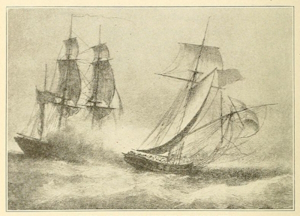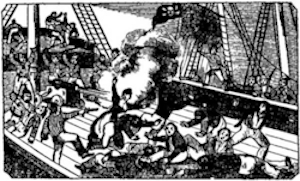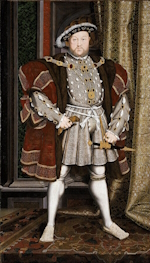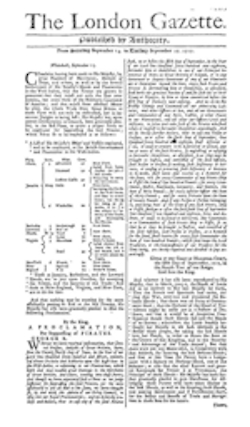 This act was passed during the reign of William III. The main purpose behind the statute was to make some corrections to the Offences at Sea Act 1536. These changes included allowing for acts of piracy to be “examined, inquired of, tried, heard and determined, and adjudged in any place at sea, or upon the land, in any of his Majesty’s islands, plantations, colonies, dominions, forts, or factories”. This enabled admirals to hold a court session to hear the trials of pirates in any place they deemed necessary, rather than requiring that the trial be held in England, thus avoiding the costly and time-consuming transport of captured pirates across the Atlantic. It also meant those accused of piracy didn’t necessarily have to be tried by a jury.
This act was passed during the reign of William III. The main purpose behind the statute was to make some corrections to the Offences at Sea Act 1536. These changes included allowing for acts of piracy to be “examined, inquired of, tried, heard and determined, and adjudged in any place at sea, or upon the land, in any of his Majesty’s islands, plantations, colonies, dominions, forts, or factories”. This enabled admirals to hold a court session to hear the trials of pirates in any place they deemed necessary, rather than requiring that the trial be held in England, thus avoiding the costly and time-consuming transport of captured pirates across the Atlantic. It also meant those accused of piracy didn’t necessarily have to be tried by a jury.
Category: Proclamations
The Piracy Act 1670
 This law was enacted during the reign of Charles II and its full name was An Act to prevent the delivery up of Merchants Shipps, and for the Increase of good and serviceable Shipping. It came into being because the captains and crews of merchant vessels commonly refused to fight when attacked by pirates. The act stipulated that ships of 200 tons or more possessing at least sixteen guns were required to fight, as long as the pirate vessel didn’t have twice as many guns. Failing to resist would result in the commander being excluded from any further commands of English ships and even imprisonment.
This law was enacted during the reign of Charles II and its full name was An Act to prevent the delivery up of Merchants Shipps, and for the Increase of good and serviceable Shipping. It came into being because the captains and crews of merchant vessels commonly refused to fight when attacked by pirates. The act stipulated that ships of 200 tons or more possessing at least sixteen guns were required to fight, as long as the pirate vessel didn’t have twice as many guns. Failing to resist would result in the commander being excluded from any further commands of English ships and even imprisonment.
Offences at Sea Act 1536
 In the 14th century Edward III (1327-1377) attempted to set up how admiralty courts should deal with piracy in A Remedy where a Merchant’s Good be robbed or perished on the Sea, but these were rather vague laws and there was often the problem of overlapping jurisdictions when dealing with such a crime. It was wasn’t until the reign of Henry VIII (1509–1547) that significant anti-piracy laws were enacted. Originally titled An Act for Pirates and Robbers on the Sea issued in 1535, it was renamed The Offences of Sea Act in 1536.
In the 14th century Edward III (1327-1377) attempted to set up how admiralty courts should deal with piracy in A Remedy where a Merchant’s Good be robbed or perished on the Sea, but these were rather vague laws and there was often the problem of overlapping jurisdictions when dealing with such a crime. It was wasn’t until the reign of Henry VIII (1509–1547) that significant anti-piracy laws were enacted. Originally titled An Act for Pirates and Robbers on the Sea issued in 1535, it was renamed The Offences of Sea Act in 1536.
This act allowed crimes such as robbery and murder to be tried as if they occurred on land. They could be tried in any county in England in any court commissioned by the king under related common law provisions for these offences. Those found guilty of piracy and treason at sea could not only be sentenced to death, but also have their lands and possessions seized.…
Proclamation of Woodes Rogers 1720
This proclamation was published in The Boston Gazette on October 17, 1720, along with a proclamation for the apprehension of the named pirates issued by Governor Rogers.
New Providence, 4th September
Several pirates are on the coast of the Bahamas, among which is one Rackam who ran away with asloop of six guns and took with him twelve men and two women. The governor of this place sent a sloop with 45 men after him. And on the second instant Doctor Rowan with his sloop and 54 hands, twelve guns, went out in order to suppress them, as did Captain Roach who arrived here from Barbados. The pirates swear destruction to all those who belong to this island.
BY HIS EXCELLENCY
WOODES ROGERS, ESQ.
GOVERNOR OF NEW PROVIDENCE, &C,
A PROCLAMATION
Whereas John Rackam, George Featherstone, John Davis, Andrew Gibson, John Howell, Noah Patrick and two women, by name Anne Fulford alias Bonny and Mary Read, did on the 22nd of August last combine together to enter on board, take, steal, and run away with out of this road of Providence, a certain sloop called the William, burthen about twelve tons, mounted with four great guns and a swivel one, belonging to Captain John Ham, and with the said sloop did proceed to commit robbery and piracy upon the boat and effects of James Gohier, Esq.,…
Act of Grace 1717
The Proclamation for Suppressing of Pirates was also known simply as the Act of Grace, although it was not actually an Act of Parliament. It was a royal proclamation issued by George I of Great Britain on 5th September 1717.
It promised a pardon for any acts of piracy committed before the following 5th January 1718 to those pirates who surrendered themselves to the authorities before a deadline of 5th September 1718. It was subsequently extended to 1st July 1719 by a second proclamation in December 1718. The proclamation also included bounties for the capture of pirates who refused to surrender themselves.
You can read the original text from The London Gazette of 13th September 1717 from The Gazette website, or download it in PDF format by clicking on the image:

